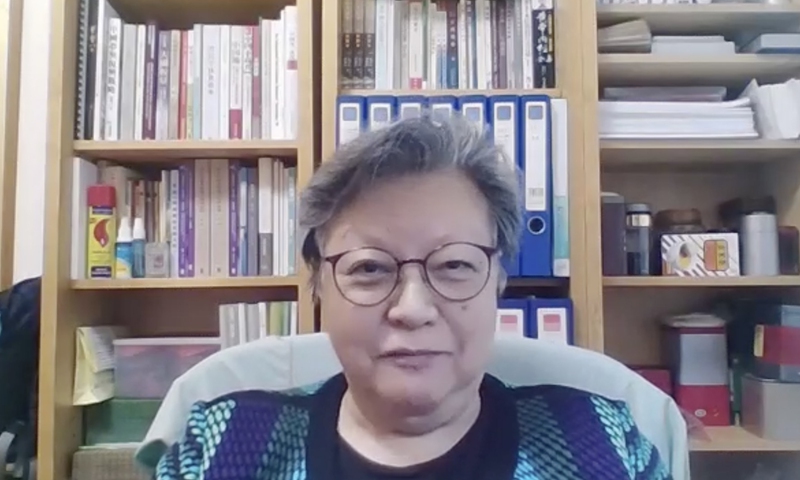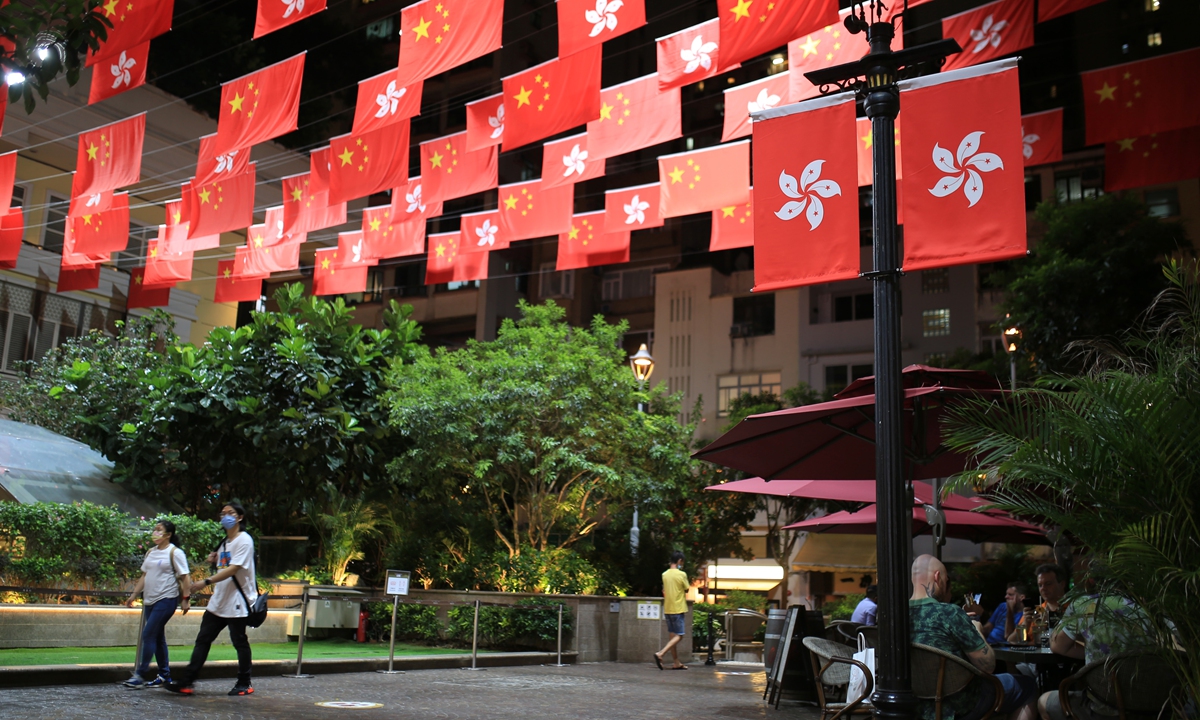
Photo: Rita Fan Hsu Lai-tai, former Legislative Council President, talks with the Global Times via a video link.
Over the past 25 years, the country has been treating Hong Kong very well, but some in Hong Kong do not feel grateful for that, and now they have to understand it and be grateful for the care shown by 1.4 billion compatriots, Rita Fan Hsu Lai-tai, the president of the first-term Legislative Council after
the city returned to the motherland, told the Global Times in an exclusive interview. Over the past years, Hong Kong made achievements not by itself but they are backed by the country's overall strength, she said.
In response to the criticism of the West and accusations against Beijing for so-called damage to the "one country, two systems" principle, Fan recalled the social turmoil in 2019, saying that they made the accusation because they failed in all their efforts to damage the "one country, two systems" in recent years. But they did not want to admit it so they shifted the blame to us, accusing us of not following the rules of the game, she said.
The "one country, two systems" means that in one country, there are two different systems under which Hong Kong can practice capitalism, which has never been changed. Capital or assets can flow in and out of the city with no limitation, Fan said.
When the black-clad violence and riots broke the peace and stability of Hong Kong, "there was no so-called system anymore, and that situation made the central government roll out measures," she said, noting that the National People's Congress formulated the law to safeguard national security, which helped restore stability in the HKSAR. "This was the situation that the Western forces did not want to see. That's why they play the trick of accusing us of damaging the 'one country, two systems' principle."
In response to some claims that Hong Kong now has only one voice and the way of governing the city is much like that in the mainland, Fan refuted those claims, saying that the opposition groups still exist, but there's no "laam chau" anymore.
The term "laam chau," which roughly means "self-destruct together," was commonly used by anti-government protesters in the social turmoil in 2019 to signify mutual dislike with the government, best expressed with the slogan "if we burn, you burn with us."
"Laam chau" was pushing the city into destruction with the aim of threatening the central government. The opposition groups did not agree to certain measures adopted by the government, but it's not the opposition groups' exclusive rights to bring up their opinions to the government. "The pro-establishment group in Hong Kong can do it too," Fan said.
If the HKSAR government's policies need to be improved, or they won't work out, every lawmaker has the responsibility of bringing up an opinion for amendment or casting the vote against them. But their aim must be for the benefit of Hong Kong, Fan said.

Hong Kong residents walk down streets under flying Chinese national flags and Hong Kong regional flags on June 28, 2022, as the city overflows with patriotic energy ahead of the 25th anniversary of its return to the motherland. Photo: Fan Lingzhi/Global Times
Under the national security law for Hong Kong and the electoral system reform, Hong Kong's political and social stability has basically been restored, and future challenges the city faces may mainly come from outside. Fan believes that some Western forces will not give up the effort of using Hong Kong to attack the country. Hong Kong has close ties with the international community economically and financially, and external forces may intend to attack Hong Kong's stock market and Hong Kong dollar in the future. In this regard, the HKSAR government should be psychologically prepared and take contingency measures.
But in the long run, Fan said she was optimistic about Hong Kong's prospects and status as an international financial center. "Businesspeople look at profits, and politicians look at power," Fan said, noting that the very existence and development of Hong Kong has never been about political reasons, but about the economic benefits it brings about. China's huge market of more than 1.4 billion people is very attractive to businesses in any country in the world, and Hong Kong is still the best bridge for them to enter the Chinese mainland market.
"If one day the country is completely unattractive to international capital, Hong Kong's prospects will be dim, but in the foreseeable future, I don't see any possibility of this happening," Fan said.
Regarding the topic of "the return of people's hearts" that has been heatedly discussed at the moment, Fan believed it not only means rebuilding Hong Kong residents' confidence in the HKSAR government, but also means Hong Kong residents should have a sense of belonging, national identity, and fulfill their responsibilities as Chinese citizens, the former official said. "In the past 25 years, Hong Kong residents have not done a good job on this respect, which has led to external forces taking advantage of the situation and constantly trying to disrupt the city."
In order to achieve "the return of people's hearts," it's necessary to solve the problem of the public concern such as the problem of the social gap and also to accelerate national education among the children. Now the HKSAR government has allocated funds to let primary and secondary schools across the city purchase the equipment required for raising the national flag and singing the national anthem, and it's believed that this will achieve some results, Fan said.
"The return of people's hearts" is a long-term task, but the situation can be significantly improved in five to ten years, she said.
When talking about the future of democracy in Hong Kong, Fan said the goal of universal suffrage has to be gradually advanced, step by step. The provisions for universal suffrage stipulated by Article 45 of the Basic Law have not been revised but whether the political reform will be restarted in the future depends on various factors.
"In terms of time, the Basic Law makes it clear that advancing universal suffrage should be done step by step. The effect is to see if the actual situation allows us to go further," she said, noting that only when Hong Kong can improve people's livelihoods and integrate into the country's overall development plan, and local residents understand and support the constitutional order of the city, will there be foundations to push forward universal suffrage.





